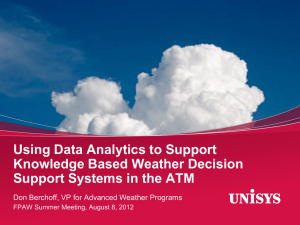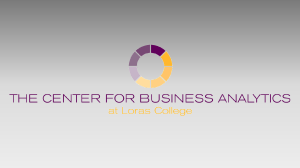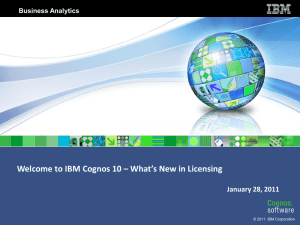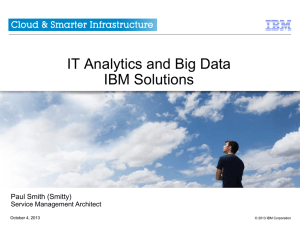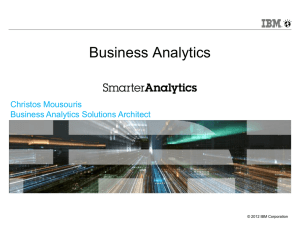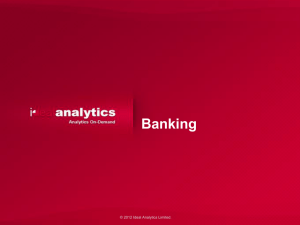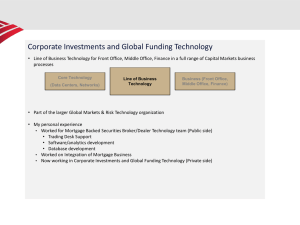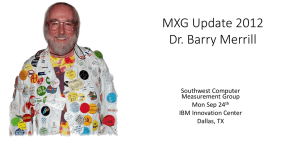System z
advertisement
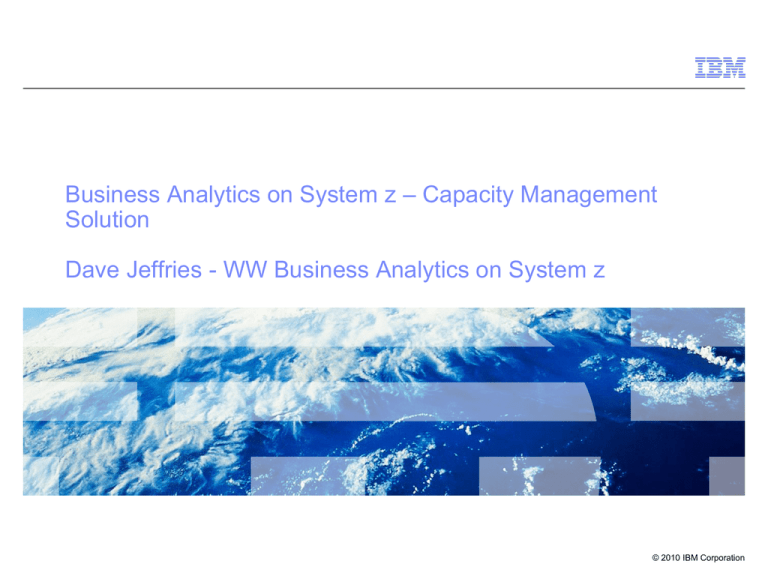
Business Analytics on System z – Capacity Management Solution Dave Jeffries - WW Business Analytics on System z © 2010 IBM Corporation Business Analytics Agenda Introduction The Solution The Value Questions/Next Steps © 2010 IBM Corporation 3 Business Analytics What is your capability to plan? We have a firm grasp on our growth projections and use a tool to manage and monitor our existing capacity & growth. We have a reasonable idea of our growth and yet believe we could do more. We are using a vendor’s tool to monitor our current situation but would like to be better prepared. We are concerned about our current future capacity planning methodology as we intend to grow our use of the mainframe and need better guidance and predictability. We are using SAS/MXG and are looking for a replacement at a lower cost and with newer function. We don’t use any tools/automation and feel we should. © 2010 IBM Corporation 4 Business Analytics Changing your vision The IBM solution is intended to create a better vision for the enterprise customer including the ability to predict where you will be or might go if you had different scenarios to test. It is intended to match as many of the existing SAS/MXG functions and features as possible in Release 1 and will be enhanced over time. Rather than compare feature for feature, think in terms of what you will be able to do over time with less cost and greater flexibility. The IBM solution is not intended to be a full SAS replacement option; that will require significantly more resources and services though it can be done if you so desire. ** Internal Use Only ** © 2010 IBM Corporation Business Analytics Introduction Customer X is seeking an alternative to its current capacity management solution. An alternative solution should: – Meet or exceed the capabilities of the current environment. – Provide a cost effective approach. – Be extensible and grow in accordance with Customer X’s IT & Business Strategy © 2010 IBM Corporation Business Analytics Customer X Capacity Management Today System Z zOS SMF Sources SMF Sources MXG Utilities SAS Components RACF SMF DASD MXG Parser RMF MXG Filter MXG-Data Preparation User SAS Data Set SAS-Base SMF TAPE Other SAS-Reporting CA-MICS © 2010 IBM Corporation Business Analytics Agenda Introduction The Solution The Value Questions/Next Steps © 2010 IBM Corporation Business Analytics IBM Capacity Management for System z • Effective cost control and management • Determine & monitor production capacity • System utilization • Operating System & sub systems • Monitor application usage • Charge backs • Maintain service level agreements • Predictable planning for growth • What if scenario modeling • Impact of • Application standardization • Server consolidation • Upgrade predictability • Incremental application growth • Facilitate orderly growth • Support emerging trends • Enterprise Cloud Computing • Predict the impacts of User On-boarding • Business Analytics solution management © 2010 IBM Corporation Business Analytics Capacity Management Solution – More Detail IBM solution involves four parts: – An extractor to read, parse, and rationalize the SMF data to replace SAS/MXG (MICS) – A repository to hold the normalized data to replace SAS data sets – A reporting engine to replace the current SAS programmed reports. – Simulation and analytics engines to (1) optimize performance level and (2) understand causal factors impacting performance at the application level. Those parts will be satisfied as follows: – Tivoli Decision Support for system Z (TDSz) will read, normalize, and store the data – DB2 on zOS (DB2) will serve as the repository for the data – Cognos 10 Business Intelligence, (C10BI), reporting engine will be the reporting platform – SPSS Statistics and Modeler will perform predictive analytics at the application level and integrate with Cognos 10 BI. – Pre-built standard reports – Solution package will include all the pieces necessary to build a reporting infrastructure across the managed environment Optional: – Services to install, configure and build additional reports – Migrate the customer from the current solution and preserve existing information © 2010 IBM Corporation Business Analytics IBM Capacity Management for System z Monthly Processor Utilization z/OS System Utilization Leading edge infrastructure Effective Cost Control and Management Predictable Planning for Growth The services to get started right away Capacity Management Reports Industry leading solutions IBM Cognos 10 On-demand Reporting Complete Investment Protection Forecasting Reports Support Emerging Trends HIstorical Data Conversions SPSS Statistics 19 Predictive analytics & Modeling Tivoli Decision Support z/OS DB2 z/OS Linux for System z System z z/OS © 2010 IBM Corporation Business Analytics Customer X Capacity Management Proposed Solution System Z zLinux SPSS SPSS Predictive Statistics Analytics zOS SMF Sources SMF Sources StatsReporting DB2 TDSz Parser RACF StatsAnalytics SMF DASD TDSz Filter RMF DB2 Data Preparation SMF TAPE DB2 Cognos Reporting User TDSz Data Preparation Other TDSz Cubing Reporting & Analysis © 2010 IBM Corporation Business Analytics Robust and flexible reporting giving greater reporting insight. User/customer receives email notification of new report © 2010 IBM Corporation Business Analytics Multiple prompts to allow User/Customer to select what information they want to display © 2010 IBM Corporation Business Analytics Information is interactive and Users/Customers can drill down by clicking on a data element © 2010 IBM Corporation Business Analytics Clicking on the MVSB gauge has opened a tabular report providing more information on that particular system © 2010 IBM Corporation Business Analytics Business Analytics – Extending the Capacity Management solution Providing Extended Insight and value with: System Z zLinux Analytics and Reporting Services SPSS Predictive Analytics SPSS Statistics Server Cognos StatsAnalytics StatsReporting Cognos BI z/VM Capacity Planning – Integrate Cognos Real Time Monitoring • Providing the ability to stream real time DB2 and SPSS data into live dashboards Feeds into budgeting with: – Expand your chargeback capabilities with Tivoli Usage and Accounting Manager • Providing integrated report on chargeback zOS DB2 TDSz Parser Simplified Stack deliverable with: TDSz Filter DB2 Data Preparation TDSz Data Preparation TDSz DB2 – IBM Smart Analytics System 9600 pre-built hardware and software stack Extend predictive analytics to other areas of the business: – Customer Sentiment – Fraud and Risk © 2010 IBM Corporation Business Analytics Agenda Introduction The Solution The Value Questions/Next Steps © 2010 IBM Corporation Business Analytics The Solution Value to Customer X Lower Total Cost of Ownership for Capacity Management – Leveraging products and capacity you may already have More Flexible Reporting and Analytical Environment – Using standardized, compliant and secure tools Leverage Predictive/Forecasting Analytics for Deeper Insight and More Optimal Planning. – Gain better insight of your resources – Plan for the future based on historical performance – Understand the what-if scenarios as your business grows – Manage SLAs more closely – Balance workload based on business targets © 2010 IBM Corporation 1 9 Business Analytics What’s in it for you… Greater insight and predictability Lower cost Standard IBM software with wide range of applicability beyond capacity planning DB2 for z/OS Tivoli Decision Support Cognos SPSS Input into future enhancements from IBM © 2010 IBM Corporation 2 0 Business Analytics Evaluation - Action plan Demonstration to you and your team Executive presentation TCO analysis Proposal Proof of Concept © 2010 IBM Corporation Business Analytics Agenda Introduction The Solution The Value Questions/Next Steps © 2010 IBM Corporation 2 2 Business Analytics Typical Utilization for Servers Windows: 5-10% Unix: 10-20% System z: 85-100% System z can help reduce your floor space up to 75%-85% in the data center For additional information please contact zcognos@us.ibm.com System z can lower your total cost of ownership, requiring as little as 30% of the power of a distributed server farm running equivalent workloads The cost of storage is typically three times more in distributed environments 22 © 2010 IBM Corporation
